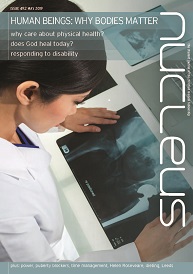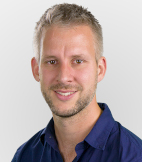Sitting down to write an article on power, I must admit my thoughts drifted to the Marvel franchise and films like them. My favourite superpower? No, not X-ray vision ? I'd like to fly.
But seriously, have you attended a lecture on power? Or heard a sermon on the topic? I didn't think so. Power is 'the ability to make something of the world'. Power isn't 'out there' but 'in here'; and in the world of medicine we are told we have lots of it. We can prescribe powerful drugs; we can influence someone's decision making; we 'control' conversations to break bad news; we hold the keys to restricted investigations. And we learn a lot; indeed, it was a medic, Sir Francis Bacon, who first coined the phrase 'Knowledge is Power'. We might not be superheroes, but as medics we are sometimes made to feel like it.
power as a gift
This isn't an entirely erroneous view. God delegated power to humanity by commanding us to be fruitful; to multiply, subdue, and have dominion over the earth. (1) In this sense, we can view power as a gift from God to be exercised wisely in our work and in our leadership.
Andy Crouch in his excellent article It's Time to Talk about Power, (2) says '[Power] is a gift - the gift of a Giver who is the supreme model of power used to bless and serve. Power is not given to benefit those who hold it. It is given for the flourishing of individuals, peoples, and the cosmos itself. Power's right use is especially important for the flourishing of the vulnerable, the members of the human family who most need others to use power well to survive and thrive: the young, the aged, the sick, and the dispossessed. Power is not the opposite of servanthood. Rather, servanthood, ensuring the flourishing of others, is the very purpose of power.'
In leadership, we will recognise that power means privilege and when we exercise power well we build currency. Patients trust our decisions. Nurses trust our reliability. Colleagues trust our integrity. Building that currency means we are given trust and space to work. This is a privilege and a gift to be exercised with care.
power distorted
And yet the fall of man is a reality; when unchecked, power can be abused. You will see this as you progress through your training. In my department you will encounter victims of domestic and sexual abuse, which at their heart are abuses of power. You'll encounter patients who you feel are manipulative, and you'll have perhaps already seen 'tugs-of-war' between departments or even between consultants on your placement. Power is abused all around us in healthcare, and we have a front row seat to see it play out.
But we need to look within as well. As medics we can be proud because of the power we yield, tempted to look down on those with less knowledge, be it someone in our tutor group or a friend studying another subject. We can also misuse power. Examples of this abound in the world of healthcare: researchers falsifying clinical trial data to suit their agenda or to gain financially. And power can be abused when it is not used to serve others. As James, the half-brother of Jesus writes, 'If anyone, then, knows the good they ought to do and doesn't do it, it is sin for them.' (James 4:17) Doctors are the first to speak out for their own welfare, when they could use that power to speak for others, both their healthcare colleagues and patients, especially the unborn, the elderly and other vulnerable patient groups. Unfortunately, Christians are not immune. There is the potential, and often an almost inevitable temptation for those in Christian leadership to abuse and misuse power in CUs, CMF groups, university societies, churches and on the wards.
Jesus and power
Jesus confronts the issues of power when two of his closest disciples ask him a question in Mark 10:35-38: 'Then James and John, the sons of Zebedee, came to him. "Teacher," they said, "we want you to do for us whatever we ask." "What do you want me to do for you?" he asked. They replied, "Let one of us sit at your right and the other at your left in your glory." "You don't know what you are asking," Jesus said. "Can you drink the cup I drink or be baptised with the baptism I am baptised with?"'
The disciples want power. And yet they soon realise that Jesus demands something different.
Jesus said to them, 'The kings of the Gentiles lord it over them; and those who exercise authority over them call themselves Benefactors. But you are not to be like that. Instead, the greatest among you should be like the youngest, and the one who rules like the one who serves.' (Luke 22:25-26). He calls them to be servants.
Throughout his earthly ministry, Jesus displays his power by spending it on others. He trades his reputation for our shame. He makes himself low to bring us high. Rather than be consumed by power, he demonstrates power through serving others.
Perhaps referring to Jesus washing his disciples' feet (3) the Apostle Paul writes:
'In your relationships with one another, have the same mindset as Christ Jesus: who, being in very nature God, did not consider equality with God something to be used to his own advantage; rather, he made himself nothing by taking the very nature of a servant, being made in human likeness.' (Philippians 2:5-7)
so how do I steward power?
Whilst we are to seek to imitate Christ, we are not Christ, and so we are all vulnerable to abusing power. We need to cultivate honest, accountable relationships with others where we can confess our pride, our misuse of power and our inaction when faced with the powerlessness of others.
Second, we need to be ready to share the good news with those who feel powerless. We can share that Jesus himself walked in their shoes. He knows what it means to be humiliated, shamed, rejected and abandoned, and he can minister to people's pain. We may have a front row seat to abuses of power, but we can interrupt the drama with the good news of Jesus to a hurting world.
Third, we need to be ready to be prophetic voices in our land. We are called not to fear power - be it political, professional, cultural or social - more than we fear God. We are called to speak out against the abuse of authority. Making a stand for the powerless will inevitably challenge individuals or structures who have power. May we choose boldness and courage over bashfulness and comfort in those moments, as we live and speak for Jesus in medicine, starting as students as we mean to go on.
leadership and power
It is a tremendous privilege to be invested with genuine power, and as a good gift from God, exercising power effectively is the key to leadership. Even though students often feel so powerless, we need to be aware of the scope of power; however subtle our power may be. And we need to develop the skills to use power well.
When we grasp the Christian world view that power is a gift, we don't earn it! We will steward it for the good of God's world rather than use it for our own benefit, regardless of its effect on others. Instead of hoarding power and making it work 'for us', we will follow Christ's example by humbly spending it on others. The Christian apologist Francis Schaeffer warned Christian leaders, 'If we have the world's mentality of wanting the foremost place, we are not qualified for Christian leadership.' True power is multiplied when image-bearers of the all-powerful God empty themselves of the benefits of their power and spread these benefits to others.
As medical students you aren't going to gain a superpower, but you will be invested with significant power through your status, knowledge and opportunities. As Uncle Ben in Spiderman says, 'with great power, comes great responsibility'. What will you do with it? Will you hoard it or spend it? As John Stott said, 'Leaders have power, but power is safe only in the hands of those who humble themselves to serve.' (4)
questions for reflection
1. In what areas of life do you wield power?
2. What temptations do you succumb to - pride, misuse of power, not using your power or even all three?
3. What steps might you take to be accountable for the power you have?
4. What does 'emptying yourself of the benefits of power' look like to you?
5. How might you prophetically speak out for those who have no power with the truth of the gospel?
John Greenall is CMF National Field Director and a paediatrician in Bedfordshire
































